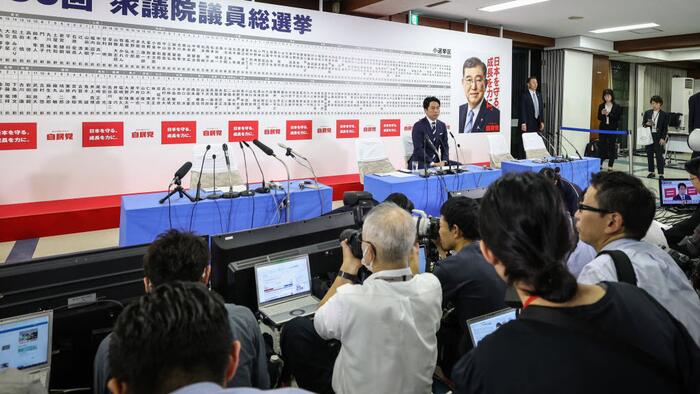In a turn of events that has the potential to significantly alter Japan’s political landscape, forecasts predict that the ruling Liberal Democratic Party (LDP) and its coalition partner, Komeito, are poised to lose their majority in the upcoming election. According to NHK, public discontent stemming from a slush-fund scandal and the highest inflation rates Japan has faced in decades has contributed to this anticipated decline in support. Prime Minister Shigeru Ishiba, who sought to secure a majority, now faces the stark reality that without obtaining the necessary 233 seats in the lower house of parliament, his government’s authority may be severely compromised. Should the LDP and Komeito fall short of this threshold, it would mark the first time since 2009 that the party has lost its coalition majority in an election.
The ramifications of the LDP’s declining public support have become increasingly evident following the scandal involving party members enriching themselves from political funds. This revelation, which mirrors corruption issues found in political spheres globally, has led to a deterioration of public trust and predictions of lost seats for the LDP. Ishiba acknowledged the challenges his party faced, specifically in addressing voter dissatisfaction regarding political funds. As the vote counts begin to surface, early reports indicate that LDP and Komeito combined may hold only 145 seats, while the main opposition party, the Constitutional Democratic Party of Japan (CDP), holds 112 seats, signaling a notable shift in the political power dynamics of the nation.
Expert analysis suggests that if the ruling coalition is unable to maintain its majority, it could lead to significant legislative gridlock, resulting in adverse short-term effects on financial markets, including the yen and the Nikkei index. Tim Waterer from KCM Trade expressed concerns over the potential for market instability, affirming the need for political stability to foster economic growth. Goldman Sachs’ market analysts share similar sentiments, indicating that any loss of parliamentary control by the LDP would likely lead to a negative outlook for Japanese equities, positioning investors for a potential decline in market performance.
As the LDP prepares for possible outcomes, the immediate future for Prime Minister Ishiba appears complicated. With a special diet session mandated by November 26 to appoint a new prime minister, success hinges on gaining cross-party support, given the loss of a majority. Options include either supporting LDP members who were previously rejected due to scandals or trying to forge cooperation with opposition parties like the CDP or Ishin. However, many observers see this latter scenario as unlikely, as leaders from these opposition parties have publicly denied intentions to collaborate, fearing a loss of support from their voter base.
In the event that Ishiba cannot secure support and must form a minority government, the implications for governance could be dire. A minority government would require precarious negotiations with opposition parties to enact policies, potentially stalling initiatives seen as unfavorable to markets. The need for cooperation may restrict the government’s ability to propose a substantial supplemental budget, previously touted at over JPY 13 trillion, alongside tax policy initiatives aimed at economic recovery. Opposition might push back against significant financial spending, complicating Ishiba’s prior assertions of fiscal stimulus as a means to recover his party’s popularity.
Lastly, investor positioning in light of these political developments appears cautiously optimistic, albeit with some underlying concerns. While some sectors may consolidate their exposure, the overall sentiment suggests a potential retreat in the coming days, as reactions to the election outcomes settle. The market could see lighter selloffs, but with continued volatility as stakeholders assess the political environment and its broader economic implications. Analysts from Goldman predict that the expected market response may be milder than forecasted but emphasize that adjustments to investor strategies will be required in the days to follow. As the political narrative unfolds, attention will remain fixated on how the newly formed government navigates fiscal policy and responds to growing inflation, all of which will play a crucial role in shaping Japan’s economic trajectory going forward.

